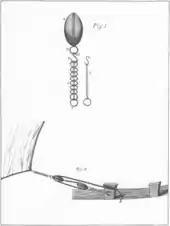Magellanic Premium
Die Magellanic Premium ist eine Auszeichnung, die seit 1790 von der American Philosophical Society verliehen wird, um die beste Entdeckung oder nützlichste Erfindung in den Kategorien Navigation, Astronomie und Naturphilosophie zu würdigen.[1] Sie besteht aus der Magellanic Gold Medal[2][3] und einem Preisgeld. Die prestigeträchtige[4] Goldmedaille ist die älteste von einer nordamerikanischen Institution zur Anerkennung wissenschaftlicher Leistungen vergebene Auszeichnung.[5]
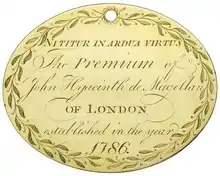
Geschichte
Im September 1785 bot der in London lebende portugiesische Naturphilosoph Jean-Hyacinthe de Magellan (portugiesisch João Jacinto de Magalhães, 1723–1790)[6] der American Philosophical Society in einem Brief 200 Guineen an, um aus den Erträgen dieses Fonds einen Preis zu stiften. Die APS unter ihrem Präsidenten Benjamin Franklin nahm das Angebot im Januar 1786 dankbar an, schrieb die Magellanic Premium als Preis der Gesellschaft aus und wählte als Medaille eine ovale Platte aus massivem Gold mit einem Wert von 10 Guineen.[7][8] Wurde anfangs nur die Medaille verliehen, wird inzwischen zusätzlich ein Geldbetrag gezahlt.[9] Im Jahr 1918 betrug dieser 139,25 US-Dollar[3] (entspricht inflationsbereinigt 2014 ca. 2.190 US-Dollar), im Jahr 2014 war der Preis mit 20.000 US-Dollar dotiert.[10]
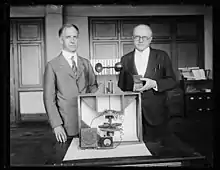
Das Prozedere bestand anfangs daraus, dass Autoren Texte (bspw. ein Traktat oder die Beschreibung einer Erfindung) unter Pseudonym bei der Gesellschaft einreichten, inklusive eines versiegelten Umschlags mit dem echten Namen der Person. Nur falls sich das Komitee nach der Begutachtung für eine Auszeichnung entschied, wurde der versiegelte Umschlag geöffnet, ansonsten wurde er ungeöffnet verbrannt und der Autor blieb unbekannt.[9] Da die Erträge des Fonds in den Anfangsjahren größer waren als für die Verleihung der Medaille notwendig, entschied die Gesellschaft im Jahr 1804, eine „Extra Magellanic Premium“ mit niedrigeren Anforderungen und einer eigenen Medaille auszuschreiben.[11] Seit der Mitte des 20. Jahrhunderts wird der Preis nicht mehr für Einreichungen vergeben, sondern für eine Leistung oder das Lebenswerk einer Person in den Bereichen Navigation, Astronomie oder Naturphilosophie.[9]
Zu Magellans Zeiten fand der internationale Handel primär mittels Seefahrt statt und es bestand großes Interesse an der Verbesserung der maritimen Navigation. In den ersten einhundert Jahren wurde der Preis in der Kategorie Navigation vor allem für Verbesserungen der Steuerung vergeben, wie die allererste Auszeichnung 1790 für einen Feder-Block, ein temporäres Ruder 1804 oder einen Steuerapparat 1809. Ausgezeichnete Erfindungen, die zu Ortsbestimmung und Routenwahl beitragen, sind eine verbesserte Seekarte, ein elektromagnetischer Kompass und Beiträge zur Astro- und Satellitennavigation. Bis 2018 wurden 12 Preise in der Kategorie Navigation verliehen.[12]

Im 18. Jahrhundert umfasste die Naturphilosophie die wissenschaftliche und technische Forschung. Bis 2018 wurden 12 Preise in dieser Kategorie vergeben, für Verbesserungen an Blitzableitern 1792, einen „schnellen Aufzug“ 1795, physikalische Phänomene an Hafeneinfahrten 1887 bis hin zu Erkenntnissen über die Sinnesorgane von Tieren sowie die Tanzsprache von Bienen 1956.[12]
In der Anfang des 19. Jahrhunderts[13][14] ergänzten Kategorie Astronomie wurde die Medaille erstmals über 150 Jahre später vergeben, 1966 für die Erkundung von Mond und Venus mit Düsenfahrzeugen.[12] Seit der 13. Verleihung in dieser Kategorie an Sandra M. Faber 2018 wurde der Preis am häufigsten in Astronomie verliehen.
Liste der Preisträger
Zwischen der Erstverleihung 1790 und dem Jahr 2021 wurden insgesamt 39 Medaillen an 44 Personen vergeben.[1]
- 2021: Sara Seager (* 1971)
- 2018: Fabiola Gianotti (* 1960) für die Entdeckung des Higgs-Bosons und ihre führende Rolle in der Hochenergiephysik[15]
- 2018: Sandra M. Faber (* 1944) für ihre Beiträge zur Untersuchung der Entstehung und Entwicklung von Galaxien und die Faber-Jackson-Relation
- 2014: Alar Toomre (* 1937) in Anerkennung der 1972 mit seinem Bruder Juri veröffentlichten numerischen Simulationen der Interaktion von Galaxien[16] und des Toomre-Kriteriums, das angibt ob eine differentiell rotierende Scheibe von Sternen in einer Galaxie stabil ist[17]
- 2008: Margaret J. Geller (* 1947) in Anerkennung ihrer Beobachtungen des Universums
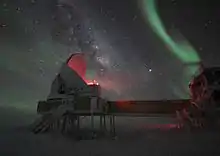
- 2004: John E. Carlstrom (* 1957) für seine Rolle bei der Messung der Anisotropie der kosmischen Hintergrundstrahlung und die Betreuung der Instrumente an der Amundsen-Scott-Südpolstation
- 2002: Wendy Freedman (* 1957) für ihre Rolle bei der präzisen Entfernungsbestimmung von 18 nahen Galaxien mit dem Hubble-Teleskop gemeinsam mit ihrem Team
- 2000: S. Jocelyn Bell Burnell (* 1943) für die Entdeckung der ersten vier Pulsare im Jahr 1967, durch die sie ein seither florierendes Wissenschaftsfeld initiiert habe
- 1997: Bradford W. Parkinson (* 1935) und Roger Easton (1921–2014) für ihre Beiträge zum Global Positioning System, durch die sie Instrumente zur präzisen Navigation für alle verfügbar gemacht hätten
- 1994: Gordon H. Pettengill (1926–2021) als „einem der führenden Radioastronomen des letzten halben Jahrhunderts“ für die Erstellung der Venuskarte auf Basis der Bilder des Synthetic Aperture Radars der Raumsonde Magellan
- 1992: Edward C. Stone (* 1936) als wissenschaftlicher Leiter des Voyager-Programms
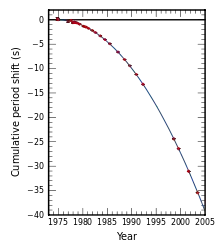 Auszeichnung 1990 für Joseph H. Taylor: Die Abstrahlung von Gravitationswellen verringert die Umlaufdauer des Hulse-Taylor-Doppelpulsars.[18]
Auszeichnung 1990 für Joseph H. Taylor: Die Abstrahlung von Gravitationswellen verringert die Umlaufdauer des Hulse-Taylor-Doppelpulsars.[18] - 1990: Joseph H. Taylor (* 1941), der Einsteins Theorie der Gravitationswellen anhand des Hulse-Taylor-Doppelpulsars bestätigte[19]
- 1988: George C. Weiffenbach und William H. Guier und ihre Gruppe am Applied Physics Laboratory der Johns Hopkins University, die den Doppler-Effekt zur Erkennung des Orbits der Sputnik-Satelliten nutzten und das Satellitennavigationssystem Transit entwickelten[20]
- 1984: J. Frank Jordon, Jet Propulsion Laboratory, für seine Rolle im Voyager-Programm, besonders für den Vorbeiflug der Sonden bei Jupiter, Saturn und ihren Monden[21]
- 1980: Martin Lindauer (1918–2008) für seine Studien zur Orientierung und Flugnavigation von Tieren[22]
- 1975: Robert Herman (1914–1997) und Ralph A. Alpher (1921–2007) für ihre Vorhersage der kosmischen Hintergrundstrahlung[23]
- 1971: Paul M. Muller (1937–2013) und William J. Sjogren für die Erstellung einer gravimetrischen Karte des Mondes und ihre Entdeckung der Mascons, großräumige Bereiche erhöhter Gesteinsdichte unter der Mondoberfläche[24][25]
- 1966: William Hayward Pickering (1910–2004, Direktor des Jet Propulsion Laboratory) für die Leitung der Erkundung von Mond und Venus mit Düsenfahrzeugen[26]
- 1961: Edward L. Beach (1918–2002), in Anerkennung der Weltumrundung mit dem U-Boot USS Triton[27]
- 1960: Stuart William Seeley (1901–1978) für seine Arbeit an SHORAN (Short Range Navigation), eines militärischen Systems für Navigation und Bombenangriffe[28]
- 1959: Charles Stark Draper (1901–1987) für seine Pionierarbeit zur Trägheitsnavigation[29]
- 1956: Karl von Frisch (1886–1982) für seine Untersuchungen der Sinnesorgane von Tieren sowie der Tanzsprache von Bienen[30]
- 1953: Philip Van Horn Weems (1889–1979), US Navy, für die Erfindung von Methoden und Messinstrumenten für die astronomische Navigation[31][32]
- 1952: James G. Baker (1914–2005) für seine Beiträge zur Theorie und Praxis der Optik, speziell für seine Kameras mit Super-Schmidt-Optik für die Beobachtung von Meteoren, die er später zur Baker-Nunn-Kamera weiterentwickelte
- 1922: Paul R. Heyl (1872–1961) und Lyman J. Briggs (1874–1963)[33] vom National Bureau of Standards für einen Erdinduktorkompass, der das Erdmagnetfeld zur elektromagnetischen Induktion in einem Generator nutzt und 1927 von Charles Lindbergh bei dessen Nonstopflug von New York nach Paris eingesetzt wurde[34]
- 1887: Lewis M. Haupt (1844–1937) für seine Arbeit zu den physikalischen Phänomenen an Hafeneinfahrten[35]
- 1864: Pliny Earle Chase (1820–1886) für die Entdeckung gewisser Beziehungen zwischen durch die Gravitation von Sonne und Mond ausgelösten, täglichen Variationen des Erdmagnetfelds und des Luftdrucks[36][37]
 Zeichnung des provisorischen Ruders von William Mugford, ausgezeichnet 1804.
Zeichnung des provisorischen Ruders von William Mugford, ausgezeichnet 1804. - 1836, Extra Magellanic Premium: James P. Espy (1785–1860) für seine theory of rain[38][39]
- 1825, Extra Magellanic Premium: Charles D. Brodie für seine Erfindung, um die seitliche Bordwand von Schiffen unterhalb der Wasseroberfläche zu reparieren[40]
- 1823, Extra Magellanic Premium: James Ewing für die Erfindung eines verbesserten Hydranten[41]
- 1820, Extra Magellanic Premium: Joshua Chapman für die Verbesserung der Produktion von Segeltuch (Canvas)[42]
- 1809, Extra Magellanic Premium: James Humphries für Modell und Beschreibung eines Steuerapparates[43]
- 1807, Extra Magellanic Premium: John Garnett für eine neue und einfache Seekarte[44][45]
- 1805, Extra Magellanic Premium: Kapitän William Mugford für die Darstellung und Beschreibung eines provisorischen Ruders, das er aus Ersatzteilen und -mast konstruiert hatte um das im Sturm verloren gegangene zu ersetzen[46][47]
- 1804: Benjamin Smith Barton (1766–1815) für seine Forschungen zu gefährlichen Insekten in den Vereinigten Staaten von Amerika[48]
- 1795: Nicholas Collin (1746–1831, schwedischer Pfarrer) für die Beschreibung eines schnellen Aufzugs (englisch speedy elevator)[49][50]
- 1793: William Thornton (1759–1828) für sein Traktat Cadmus[2]
- 1792: Robert Patterson für die Verbesserung von metallischen Leitern und Blitzableitern[51]
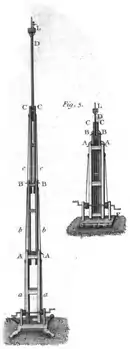 Skizze des „schnellen Aufzugs“ von Nicholas Collin, ausgezeichnet 1795.
Skizze des „schnellen Aufzugs“ von Nicholas Collin, ausgezeichnet 1795. - 1790: Francis Hopkinson (1737–1791) für die Beschreibung eines Blocks mit Feder, um die beim Segeln wirkenden Kräfte bei Böen zu reduzieren (englisch spring-block)[52]
Weblinks
- The Magellanic Premium of the American Philosophical Society, Website der APS
- Bild der Medaille in einer virtuellen Ausstellung der APS
Einzelnachweise
- The Magellanic Premium of the American Philosophical Society, Website der APS. Abgerufen am 24. Mai 2021.
- William Thornton: Cadmus, or a Treatise on the Elements of Written Language, Illustrating, by a Philosophical Division of Speech, the Power of Each Character, Thereby Mutually Fixing the Orthography and Orthoepy. With an Essay on the Mode of Teaching the Deaf, or Surd and Consequently Dumb, to Speak. In: Transactions of the American Philosophical Society 3, 1793, S. 262–331, doi:10.2307/1004878.
- Bulletin of the National Research Council, 1921, S. 5.
- National Aeronautics and Space Administration (Hrsg.): NASA Activities. Band 2, Nr. 12, 1971, S. 212.
- Tim Stephens: Sandra Faber receives American Philosophical Society’s Magellanic Premium Medal. Website der University of California, Santa Cruz. 29. April 2019.
- Sidney Lee (Hrsg.): Magellan, Jean Hyacinthe de. In: Dictionary of National Biography, Band 35. Smith, Elder & Co, London 1893 (Volltext auf Wikisource).
- Extracts from the Minutes of the American Philosophical Society, Respecting a Donation Proposed by Mr. J. H. de Magellan, of London. In: Transactions of the American Philosophical Society 2, 1786, S. xix–xxii, JSTOR 1005162.
- Early Proceedings of the American Philosophical Society for the Promotion of Useful Knowledge, Compiled by One of the Secretaries, from the Manuscript Minutes of Its Meetings from 1744–1838. In: Proceedings of the American Philosophical Society 22(119), Part III, Juli 1885, JSTOR 982538.
- Premium Conditions and Rules, Website der APS. Abgerufen am 31. Oktober 2019.
- International Congress of Distinguished Awards (Hrsg.): Total Money Awarded. Abgerufen am 30. Oktober 2019.
- Early Proceedings of the American Philosophical Society for the Promotion of Useful Knowledge, Compiled by One of the Secretaries, from the Manuscript Minutes of Its Meetings from 1744–1838. In: Proceedings of the American Philosophical Society 22(119), Part III, Juli 1885, S. 366, JSTOR 982556.
- Award Categories . Website der American Philosophical Society. Abgerufen am 31. Oktober 2019.
- Advertisement. In: Transactions of the American Philosophical Society 4, 1799, S. vii–x, JSTOR 1005072: ohne Astronomie.
- Conditions of the Magellanic Premium. In: Transactions of the American Philosophical Society 6, 1809, S. vii, JSTOR 1004753: mit Astronomie.
- 2018 Magellanic Premium: Fabiola Gianotti. Youtube-Kanal der American Philosophical Society, bei Minute 2:42: “The Magellanic Premium medal is engraved: for the discovery of the Higgs boson and the leadership in high energy physics.”
- Alar Toomre, Juri Toomre: Galactic bridges and tails. In: The Astrophysical Journal 178, 1972, S. 623–666, doi:10.1086/151823, bibcode:1972ApJ...178..623T.
- Alar Toomre: On the gravitational stability of a disk of stars. In: The Astrophysical Journal 139, 1964, S. 1217–1238, doi:10.1086/147861, bibcode:1964ApJ...139.1217T.
- Daten aus: Joel M. Weisberg, Joseph H. Taylor: Relativistic Binary Pulsar B1913+16: Thirty Years of Observations and Analysis, Juli 2004, arxiv:astro-ph/0407149.
- Joseph H. Taylor: Testing Gravity with Binary Pulsars. In: Proceedings of the American Philosophical Society 137(3), September 1993, S. 357–363, JSTOR 986997.
- William H. Guier, George C. Weiffenbach: Genesis of Satellite Navigation. Johns Hopkins APL Technical Digest 18(2), 1997, S. 178–181.
- JPL Engineer Awarded Magellanic Premium Award. Website des Jet Propulsion Laboratory, 1. Mai 1984.
- vgl. Bert Hölldobler: Martin Lindauer. In: Proceedings of the American Philosophical Society 154(4), Dezember 2010, S. 485–491, JSTOR 23056867.
- Ralph A. Alpher, Robert Herman: Big Bang Cosmology and the Cosmic Black-Body Radiation. In: Proceedings of the American Philosophical Society 119(5), Oktober 1975, S. 325–348, JSTOR 986676.
- William L. Sjogren: The Evolution of Lunar Gravity Measurements. In: Proceedings of the American Philosophical Society 116(5), Oktober 1972, S. 357–361, JSTOR 986066.
- Paul M. Muller: Implications of the Lunar Mascon Discovery. In: Proceedings of the American Philosophical Society 116(5), Oktober 1972, S. 362–364, JSTOR 986067.
- William Hayward Pickering: Navigating The Mariner Spacecraft to Mars. In: Proceedings of the American Philosophical Society 110(5), Oktober 1966, S. 332–339, JSTOR 986022.
- Edward L. Beach: The Nature of Submarining. In: Proceedings of the American Philosophical Society 105(6), Dezember 1961, S. 513–516, JSTOR 985159.
- Stuart William Seeley: Shoran–A Precision Five Hundred Mile Yardstick. In: Proceedings of the American Philosophical Society 105(4), August 1961, S. 447–451, JSTOR 985500.
- Charles S. Draper: Navigation–From Canoes to Spaceships. In: Proceedings of the American Philosophical Society 104(2), April 1960, S. 113–123, JSTOR 985654.
- Karl von Frisch: The "Language" and Orientation of the Bees. In: Proceedings of the American Philosophical Society 100(5), Oktober 1956, S. 515–519, JSTOR 3143684.
- Philip Van Horn Weems: Celestial Navigation. In: Proceedings of the American Philosophical Society 98(4), August 1954, S. 270–272, JSTOR 3143880.
- vgl. Connie L. Lester: P. V. H. Weems. In: Tennessee Historical Society (Hrsg.): Tennessee Encyclopedia. 8. Oktober 2017.
- Paul R. Heyl, Lyman J. Briggs: The Earth Inductor Compass. In: Proceedings of the American Philosophical Society 61(1), 1922, S. 15–32, JSTOR 984431.
- National Bureau of Standards (Hrsg.): National Aviation History Month: Earth Inductor Compass. 9. November 2016.
- Lewis M. Haupt: The Physical Phenomena of Harbor Entrances. Their Causes and Remedies. Defects of Present Methods of Improvement. In: Proceedings of the American Philosophical Society 25(127), Januar bis Juni 1888, S. 19–41, JSTOR 983278.
- Pliny Earle Chase: On numerical relations of gravity and magnetism. In: Silliman's American Journal, Mai 1865. Nachdruck in: The London, Edinburgh, and Dublin Philosophical Magazine and Journal of Science 30(200), S. 52–57, doi:10.1080/14786446508643932.
- Pliny Earle Chase: On the Numerical Relations of Gravity and Magnetism. In: Transactions of the American Philosophical Society 13(1), 1865, S. 117–136, doi:10.2307/1005349.
- James P. Espy: Theory of rain, hail, and snow, water-spouts, land-spouts, variable winds, and barometric fluctuations. Philadelphia 1836, OCLC 489056079.
- Early Proceedings of the American Philosophical Society for the Promotion of Useful Knowledge, Compiled by One of the Secretaries, from the Manuscript Minutes of Its Meetings from 1744–1838. In: Proceedings of the American Philosophical Society 22(119), Part III, Juli 1885, S. 682–683, JSTOR 982588.
- Early Proceedings of the American Philosophical Society for the Promotion of Useful Knowledge, Compiled by One of the Secretaries, from the Manuscript Minutes of Its Meetings from 1744–1838. In: Proceedings of the American Philosophical Society 22(119), Part III, Juli 1885, S. 542–543, JSTOR 982577.
- Early Proceedings of the American Philosophical Society for the Promotion of Useful Knowledge, Compiled by One of the Secretaries, from the Manuscript Minutes of Its Meetings from 1744–1838. In: Proceedings of the American Philosophical Society 22(119), Part III, Juli 1885, S. 518, JSTOR 982575.
- Early Proceedings of the American Philosophical Society for the Promotion of Useful Knowledge, Compiled by One of the Secretaries, from the Manuscript Minutes of Its Meetings from 1744–1838. In: Proceedings of the American Philosophical Society 22(119), Part III, Juli 1885, S. 494, JSTOR 982572.
- Early Proceedings of the American Philosophical Society for the Promotion of Useful Knowledge, Compiled by One of the Secretaries, from the Manuscript Minutes of Its Meetings from 1744–1838. In: Proceedings of the American Philosophical Society 22(119), Part III, Juli 1885, S. 415, JSTOR 982561.
- John Garnett: Description and Use of a New and Simple Nautical Chart. In: Transactions of the American Philosophical Society 6, 1809, S. 303–318, doi:10.2307/1004807.
- Early Proceedings of the American Philosophical Society for the Promotion of Useful Knowledge, Compiled by One of the Secretaries, from the Manuscript Minutes of Its Meetings from 1744–1838, Sitzung vom 16. Oktober 1807. In: Proceedings of the American Philosophical Society 22(119), Part III, Juli 1885, S. 400, JSTOR 982559.
- William Mugford: An Account and description of a Temporary Rudder. In: Transactions of the American Philosophical Society 6, 1809, S. 203–208, doi:10.2307/1004792. Grafik
- Early Proceedings of the American Philosophical Society for the Promotion of Useful Knowledge, Compiled by One of the Secretaries, from the Manuscript Minutes of Its Meetings from 1744–1838, Sitzung vom 15. März 1805. In: Proceedings of the American Philosophical Society 22(119), Part III, Juli 1885, S. 372, JSTOR 982557.
- Early Proceedings of the American Philosophical Society for the Promotion of Useful Knowledge, Compiled by One of the Secretaries, from the Manuscript Minutes of Its Meetings from 1744–1838, Sitzung vom 21. Dezember 1804. In: Proceedings of the American Philosophical Society 22(119), Part III, Juli 1885, S. 369, JSTOR 982556.
- Nicholas Collin: Description of a Speedy Elevator. In: Transactions of the American Philosophical Society 4, 1799, S. 519–525, doi:10.2307/1005127.
- Für die Lebensdaten, siehe Literatur von und über Nicholas Collin in der bibliografischen Datenbank WorldCat.
- Robert Patterson: An Improvement on Metalic Conductors or Lightening-Rods. In: Transactions of the American Philosophical Society 3, 1793, S. 321–324, doi:10.2307/1004880.
- Francis Hopkinson: Description of a Spring-Block, Designed to Assist a Vessel in Sailing. In: Transactions of the American Philosophical Society 3, 1793, S. 331–333, doi:10.2307/1004885.
